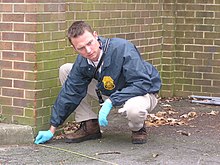
Back تحقيق جنائي Arabic Следства Byelorussian Penyerep-nyerepan kejahatan BEW Досъдебно разследване Bulgarian তদন্ত Bengali/Bangla Йĕрлĕм CV Rikostutkimus Finnish חקירה פלילית HE अपराध अन्वेषण Hindi Investigasi kriminal ID


Criminal investigation is an applied science that involves the study of facts that are then used to inform criminal trials. A complete criminal investigation can include searching, interviews, interrogations, evidence collection and preservation, and various methods of investigation.[1] Modern-day criminal investigations commonly employ many modern scientific techniques known collectively as forensic science.
Criminal investigation is an ancient science that may have roots as far back as c. 1700 BCE in the writings of the Code of Hammurabi. In the code, it is suggested that both the accuser and the accused had the right to present evidence they collected.[2] In the modern era, criminals investigations are most often done by government police forces. Private investigators are also commonly hired to complete or assist in criminal investigations.
An early recorded professional criminal investigator was the English constable. Around 1250 CE, it was recorded that the constable was to "... record...matters of fact, not matters of judgment and law."[3]
- ^ Charles E. O'Hara & Gregory L. O'Hara (1994) Fundamentals of Criminal Investigation (Sixth Edition) ISBN 0-398-05889-X[page needed]
- ^ Burgess, Ann Wolbert; Regehr, Cheryl; Roberts, Albert R. (2009). Victimology: Theories and Applications. Jones & Bartlett Publishers. p. 103. ISBN 978-1-4496-4371-3.
- ^ Henry of Bratton (1968) Bracton On the Laws and Customs of England, volume 4 page 136, Belknap Press